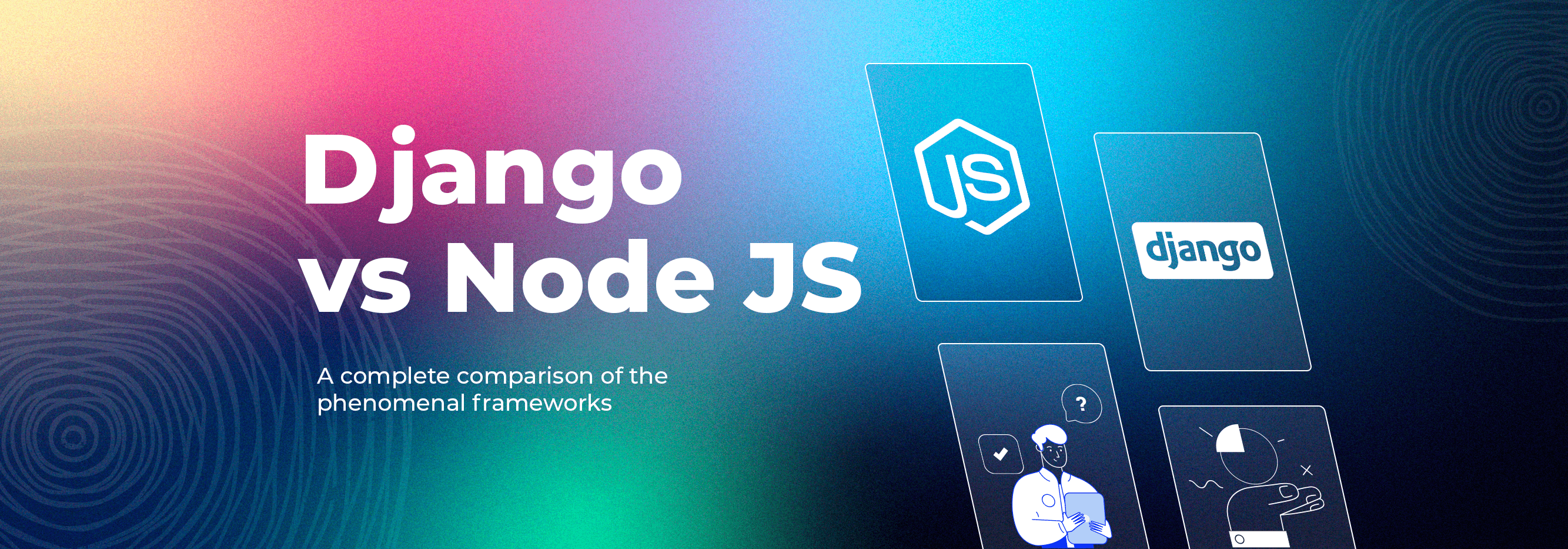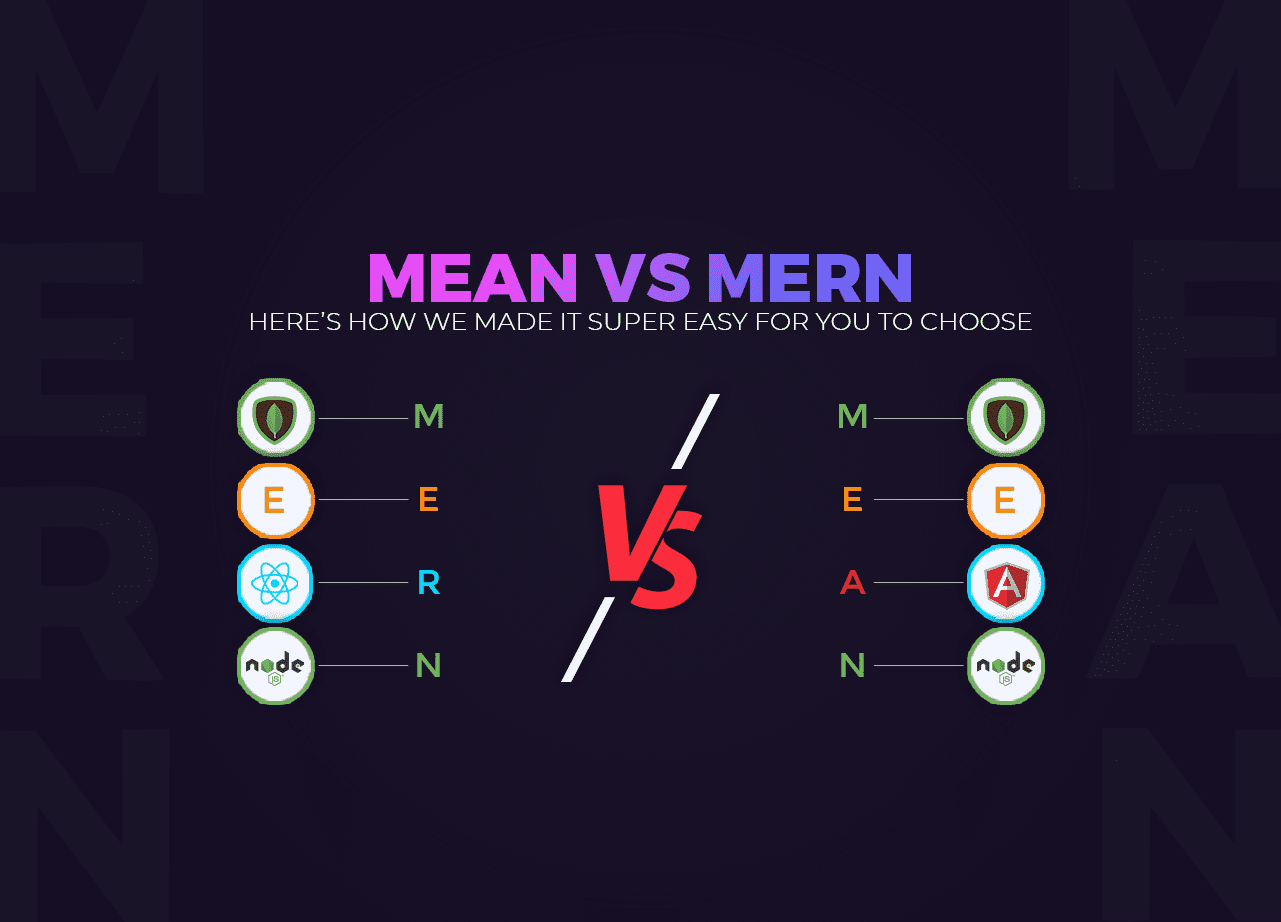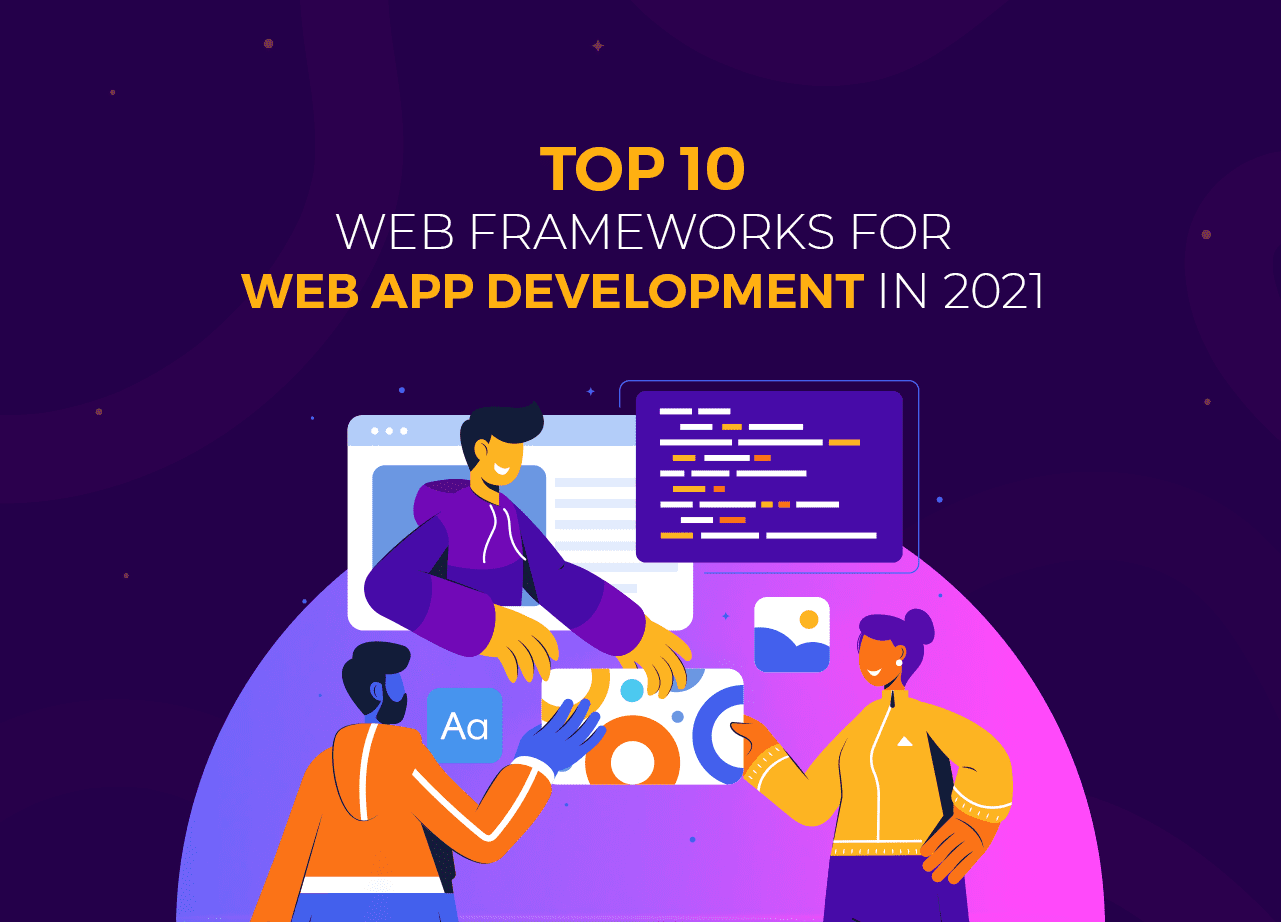In the vast and ever-evolving landscape of web development, choosing the right framework is crucial for building robust and efficient applications.
Django and Node.js (commonly referred to as simply “Node”) are two popular web frameworks that have garnered a significant following. While Django is a Python-based framework known for its scalability and rapid development capabilities, Node.js, powered by JavaScript, has gained fame for its high performance and real-time application capabilities.
With the rapid advancement of the digital era, companies are constantly searching for new and improved ways to stay ahead of the curve and satisfy the ever-growing demands of their customers.
The modern demographic or audience always gravitates toward an intuitive, attractive, and seamless website. And for a high functioning and efficient web application, you need a suitable backend framework that supports it.
In this blog post, we will delve into a comprehensive comparison of Django and Node.js, exploring their features, strengths, and use cases to help you make an informed decision when choosing a web framework.
As of 2023, 89% of companies have already adopted a digital business strategy, and yet 45% of executives have stated that their company does not have the right technology for a complete digital transformation.
NodeJS and Django are emerging as two of the most popular frameworks in recent years. Both of these platforms are used to create and support complex web applications and deliver a top-notch user experience.
Let’s discuss the difference between NodeJS and Django in detail.
Table of Contents
ToggleDefinition: Django VS NodeJS
What is Django?
Django was created and released between 2003-2005 in the Lawrence Journal-World newspaper and has been gaining popularity ever since.
With a python web framework, Django provides fast-paced development for high-functioning and secure websites. It handles web development while you get the freedom to focus on writing and designing your app.
Django is free to use and open-source, built primarily to eliminate repetition and simplify the creation of complex and database-driven websites.
What is NodeJS?
NodeJS is adored by developers all around the world since its inception in 2009 by Ryan Dahl.
With a cross-platform JavaScript framework, NodeJS is perfect for building data-intensive applications and efficient server-side web applications. Built on Chrome’s V8 engine with the main purpose of increasing multitasking functionalities, it provides one of the fastest code executions.
NodeJS is free to use and open-source, and in addition to its high flexibility and lightweight structure, it has many modules that simplify the development process.
Django and NodeJS have been preferred by many developers and used by many companies all over the world.
Popularity & Usage: Django VS NodeJS
Popularity:
In the battle of Node vs Django: NodeJS takes the crown when it comes to popularity, with Django coming up close behind.
Node JS is used by over 30 million websites. and 85k unique domains, while Django has helped develop 107k websites and 46k unique domains.

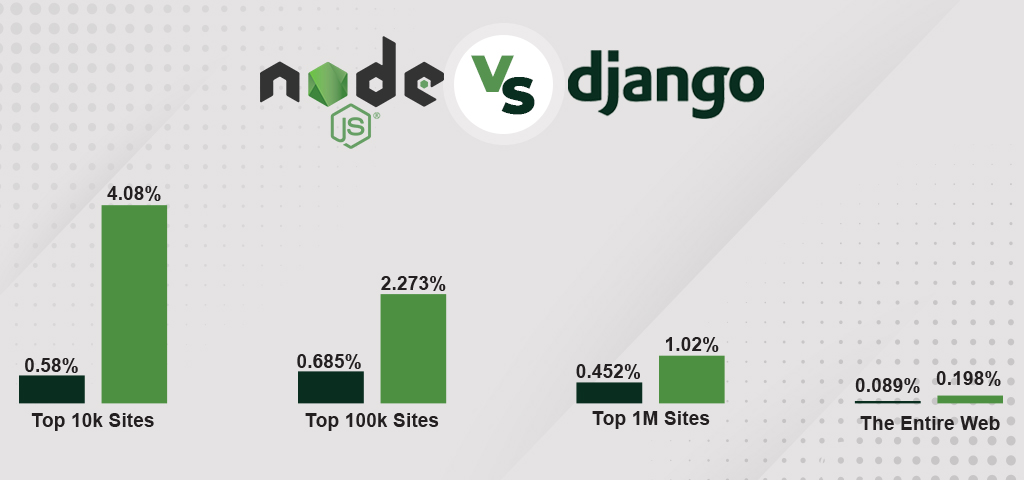
Despite the rapid growth of Django in recent years, NodeJS is currently beating it in the website market share and every website category except “science & education” and “heavy industry & engineering”
Some of the companies that use Django and why:
1. The Washington Post:
Django was initially created for an online newspaper, so it comes as no surprise that The Washington Post uses it to manage its heavy traffic;

2.Instagram:
One of the most widespread social networks with 1 billion active users every month, uses Django to instantly resolve issues, add updates, manage the users, and run the application without a hitch;

3.Mozilla:
This popular web browser substituted PHP for Python, to use Django for its functionalities and ability to manage huge traffic with ease;
4.Reddit:
Another platform for social networking to have discussions, share opinions, and more, uses Django for its efficiency to manage huge traffic and deliver a seamless experience;
5.Spotify:
One of the biggest libraries for music that utilises Django machine learning on its technical side to avail the convenience of Python.

Some of the companies that use NodeJS and why:
1.Netflix:
NodeJS was used to build the user interface of Netflix, one of the most popular streaming platforms. NodeJS was preferred because of its many modules providing flexibility and scalability;
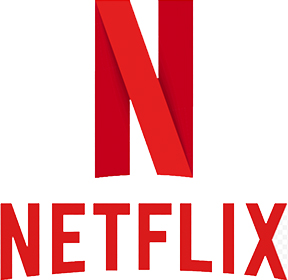
2.Uber:
One of the first companies that used NodeJS to its full capacity was Uber. The go-to taxi service used NodeJS to build its platform because of its open-source community, rapid processing, and ease of bug-fixing;

3.LinkedIn:
The number one platform for job searching and professional networking adopted NodeJS to re-write their entire LinkedIn app. The app now runs 20x faster as a result of the transition to NodeJS;
4.NASA:
The biggest organization for research and exploration of space used a feature of NodeJS known as Microservices to transfer their whole enterprise to the cloud;

5.PayPal:
The most trusted online payment gateway PayPal, uses NodeJS to build the user interface for both client and server-side operations with JavaScript. NodeJS provides a streamlined development process.
The reason behind the popularity of NodeJS and Django among large-scale enterprises and multi-national corporations is the unique functionalities of their architecture.
Also read: 7 Best Nodejs Frameworks for Web Apps
Looking for intuitive and innovative web development solutions?
You’re at the right place!
Architecture: Django VS NodeJS
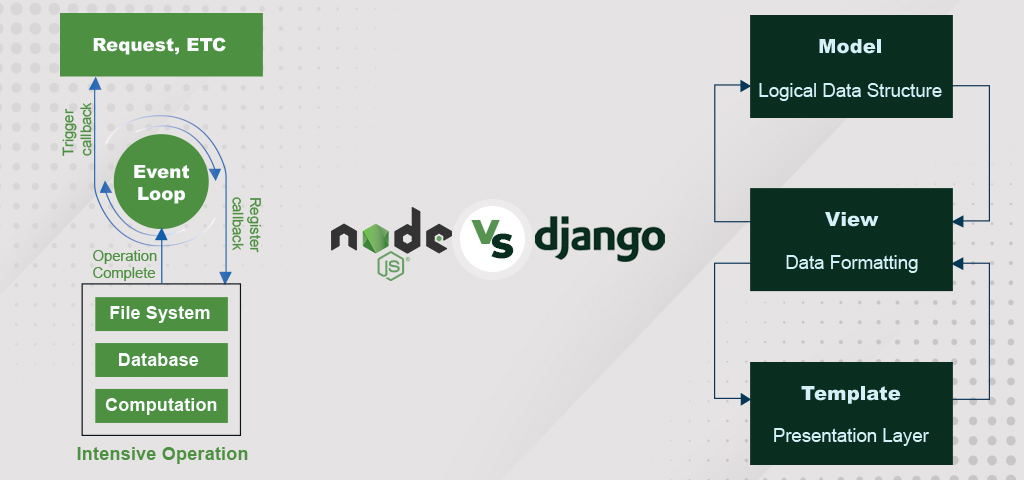
Django architecture:
The Django architecture is based on Model-View-Template (MVT) structure.
- Model is the interface for your data, and it maintains the whole logical data structure of the web application. It is the mediator between the user interface and the database;
- The view is the user interface, your end-users experience this part when a website is rendered;
- A template controls the elements that get displayed in the user interface.
It offers rapid development speed for scalable and secure web applications. Also, it allows easy modifications because of its component-based pattern.
NodeJS architecture:
The NodeJS architecture follows a Single Threaded Event Loop model.
The heart of its architecture is the “event loop”
The event loop takes care of the requests and callbacks to ensure seamless operations for high-end applications.
With a runtime environment, NodeJS architecture can handle multiple concurrent requests with ease. And additionally, it eliminates the need for multiple threads, as it can process requests one-by-one in a single thread pattern.
Also read: Reactjs vs React Native: Difference Between React and React Native
Advantages: Django VS NodeJS
Top 5 features and advantages of Django:
1. Python:
Django leverages the power and simplicity of Python to create readable, clean, and flexible code for web applications.
Python is one of the easiest to learn and use programming languages, and it is adored by developers all around the world;
2. Batteries included:
Django is considered to be a batteries-included framework. It comes with many additional resources offering various functionalities and features.
Here are some of the resources that come with Django:
- URL routing;
- HTTP libraries;
- Templating libraries;
- Object-Relational Mapping (ORM);
- Default admin interface;
- Multi-site support;
- Multi-language support;
- AJAX support;
- Easy database migrations;
3. Community:
Developers can fast-track the development process by leveraging the continuous updates provided by Django’s large and active community.
Code snippets, plug-ins, and various other updates are continually added by the members. Also, this makes it easy to spot and resolve errors and glitches quickly;
4. Scalability:
By modifying decoupled components, developers can scale and customize the web framework according to their needs.
You can run different servers for the application, media, and database and also use load-balancing or clustering to use the application across multiple servers;
5. Compatibility:
Django is compatible with major operating systems like macOS, Linux, and Windows. It provides an Object-Relational Mapping (ORM) system that helps developers to use the framework with many widely used databases.
Top 5 features and advantages of NodeJS:
1. Scalability:
NodeJS follows an event-based structure, providing unlimited nodes that can be added to the core programming. You can scale your framework vertically and horizontally, giving your application room to grow by updating the existing programming according to your needs;
2. High speed and performance:
NodeJS runs on Google’s V8 JavaScript engine, making it one of the fastest options available. It offers a smooth and seamless environment with direct input-output operations, making the code run relatively quick;
3. Caching:
When changes are requested to the app, they are cached in the app’s memory. NodeJS provides robust caching abilities, simplifying the re-execution of requests without diving into the data history;
4. Community:
NodeJS has a helpful active community supporting developers at all times. They provide open-source solutions for various kinds of applications constantly, letting your programmers work and solve issues without a hitch;
5. Flexibility:
To make changes in a NodeJS framework, you don’t have to make changes to the core programming. You need to make changes to the specific nodes to get the desired results. Developers can utilise APIs to incorporate HTTP, DNS, TCP, etc. into the framework.
Now that we have discussed the good side of NodeJS vs Django, let’s explore their disadvantages.
Limitations: Django VS NodeJS
Drawbacks of Django:
- Django is monolithic in nature with certain predefined files and variables, reducing its flexibility;
- Django is too bloated for smaller projects as it is a code-intensive framework with a lot of processing time;
- Django cannot handle multiple requests concurrently;
- Developers need to learn and know Django from top to bottom to make it work effectively;
- Django’s ORM system lacks certain features, limiting the use of SQLAlchemy, which is an important Python toolkit.
Drawbacks of NodeJS:
- Unstable API: Developers have to modify accessible code bases to keep up with the latest versions of the Application Programming Interface (API);
- NodeJS lacks strong library support when compared to other frameworks;
- NodeJS is relatively not viable for heavy computation as the single thread event loop delays the processing of queued requests;
- An asynchronous programming model can be beneficial for building scalable applications, but multiple callbacks in a queue can trigger a “callback hell,” which adversely affects the quality of the codes;
- Lack of experienced NodeJS developers, because developers have to be adept at using back-end JavaScript to comfortably use this framework.
Also read: 5 Top Reasons Why You Should Use Nodejs with React for Web Development
Difference between NodeJS and Django:
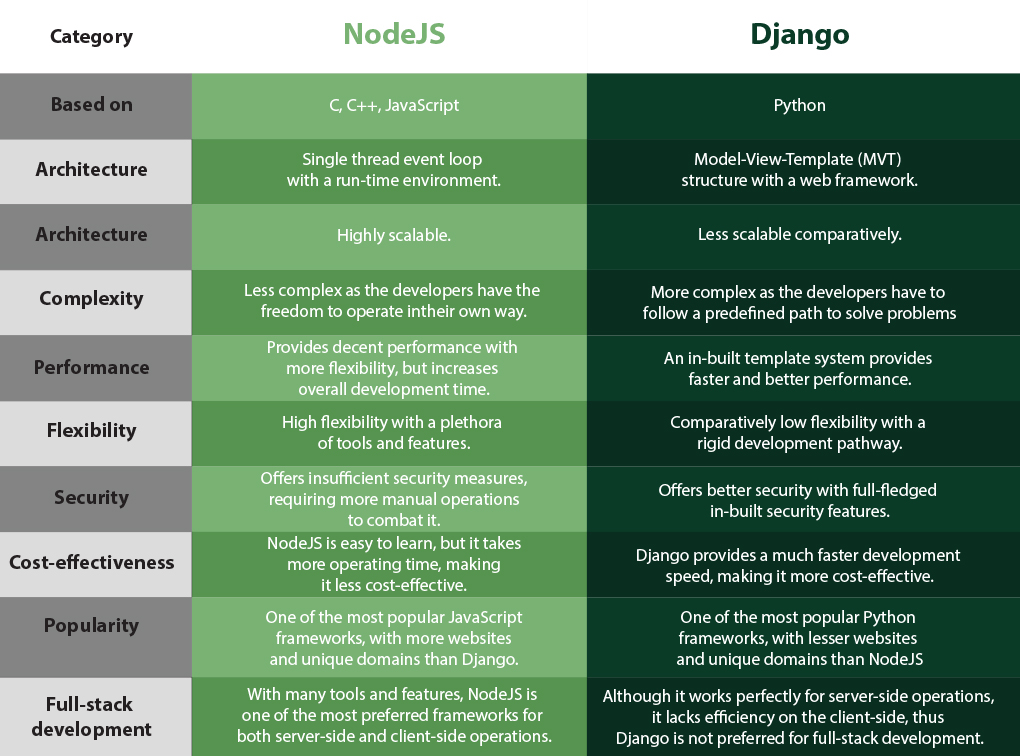
Integrating NodeJS with Django is possible and exceedingly useful in certain situations. They can form a high-functioning backend by complementing each other’s benefits. If your application or website requires a lot of multiplayer or real-time aspects, integrating NodeJS with Django is an ideal choice.
Companies like Instagram and Pinterest utilize the combination of NodeJS and Django for their backend operations.
Takeaway:
In Django VS NodeJS, both frameworks are effective platforms for creating web-based applications.
It all comes down to specific requirements, preferences, and experience when choosing between Nodejs and Django. NodeJS is a JavaScript-based platform to build data-intensive web applications like game apps, social networking websites, live-streaming, etc. While Django is a Python-based framework that provides fast-paced development for highly scalable web applications.
With numerous benefits and features, NodeJS and Django are preferred all around the world by many large corporations for the creation and maintenance of their web applications.
If you are looking for exceptional web development services or further advice regarding web development, contact us!
With 18+ years of proven experience, Communication Crafts is the one-stop shop for all your web development needs.
From regular maintenance of websites to custom website development, our top-tier NodeJS and Django developers provide intuitive and cost-effective digital solutions that can take your business to new heights.
Looking for intuitive and innovative web development solutions?
You’re at the right place!
 Blog Communication Crafts
Blog Communication Crafts